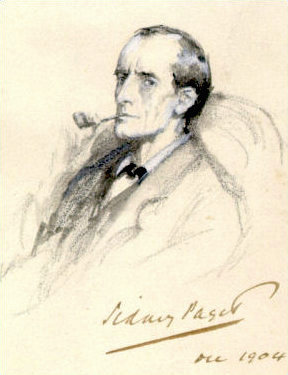Arthur Conan Doyle
Sir Arthur Conan Doyle (22 May 1859 – 7 July 1930) was a British writer and medical doctor, best known for creating the character Sherlock Holmes, who is now one of the most famous literary characters in the world. Doyle's body of work extends beyond the adventures of Holmes and includes historical novels, science fiction, romances, plays, and non-fiction.
Early Life[edit | edit source]
Arthur Conan Doyle was born in Edinburgh, Scotland, to Charles Altamont Doyle and Mary Foley. Despite his family's impoverished circumstances, Doyle's parents ensured he received a quality education. He attended Jesuit schools, including Stonyhurst College, before studying medicine at the University of Edinburgh Medical School. It was during his university years that Doyle began writing short stories.
Medical Career[edit | edit source]
After completing his studies, Doyle served as a ship's surgeon on a voyage to the West African coast. He then set up a medical practice in Southsea, Portsmouth. Although his practice was not overly successful, it allowed him the time to write. Doyle's experiences as a doctor significantly influenced his writing, most notably through the character of Dr. John Watson, Sherlock Holmes's friend and biographer.
Literary Career[edit | edit source]
Doyle's first significant work, A Study in Scarlet, introduced the characters of Sherlock Holmes and Dr. Watson. Published in Beeton's Christmas Annual in 1887, the novel was a success, leading to more stories featuring Holmes and Watson. Despite Doyle's ambivalent feelings towards his creation, Holmes's popularity persisted, resulting in a series of short stories and novels over the next 40 years.
In addition to his detective stories, Doyle wrote historical novels, such as The White Company, which he considered his best work. He also explored science fiction in The Lost World, which introduced Professor Challenger and delved into themes of adventure and exploration.
Spiritualism and Later Life[edit | edit source]
In his later years, Doyle became a fervent advocate of Spiritualism, a belief in the possibility of communication with the dead through mediums. This interest influenced his writing and public lectures. Despite the controversy this stance generated, Doyle remained a dedicated Spiritualist until his death.
Death and Legacy[edit | edit source]
Sir Arthur Conan Doyle died of a heart attack on 7 July 1930, at his home in Crowborough, East Sussex, England. His creation, Sherlock Holmes, has transcended literature, inspiring countless adaptations in film, television, and other media. Doyle's work in the detective genre has also significantly influenced the development of crime fiction.
Doyle's contributions to literature and the creation of Sherlock Holmes have cemented his place as one of the leading figures in English literature. His works continue to be celebrated for their imagination, storytelling, and complex characters.
Search WikiMD
Ad.Tired of being Overweight? Try W8MD's physician weight loss program.
Semaglutide (Ozempic / Wegovy and Tirzepatide (Mounjaro / Zepbound) available.
Advertise on WikiMD
|
WikiMD's Wellness Encyclopedia |
| Let Food Be Thy Medicine Medicine Thy Food - Hippocrates |
Translate this page: - East Asian
中文,
日本,
한국어,
South Asian
हिन्दी,
தமிழ்,
తెలుగు,
Urdu,
ಕನ್ನಡ,
Southeast Asian
Indonesian,
Vietnamese,
Thai,
မြန်မာဘာသာ,
বাংলা
European
español,
Deutsch,
français,
Greek,
português do Brasil,
polski,
română,
русский,
Nederlands,
norsk,
svenska,
suomi,
Italian
Middle Eastern & African
عربى,
Turkish,
Persian,
Hebrew,
Afrikaans,
isiZulu,
Kiswahili,
Other
Bulgarian,
Hungarian,
Czech,
Swedish,
മലയാളം,
मराठी,
ਪੰਜਾਬੀ,
ગુજરાતી,
Portuguese,
Ukrainian
Medical Disclaimer: WikiMD is not a substitute for professional medical advice. The information on WikiMD is provided as an information resource only, may be incorrect, outdated or misleading, and is not to be used or relied on for any diagnostic or treatment purposes. Please consult your health care provider before making any healthcare decisions or for guidance about a specific medical condition. WikiMD expressly disclaims responsibility, and shall have no liability, for any damages, loss, injury, or liability whatsoever suffered as a result of your reliance on the information contained in this site. By visiting this site you agree to the foregoing terms and conditions, which may from time to time be changed or supplemented by WikiMD. If you do not agree to the foregoing terms and conditions, you should not enter or use this site. See full disclaimer.
Credits:Most images are courtesy of Wikimedia commons, and templates, categories Wikipedia, licensed under CC BY SA or similar.
Contributors: Prab R. Tumpati, MD




